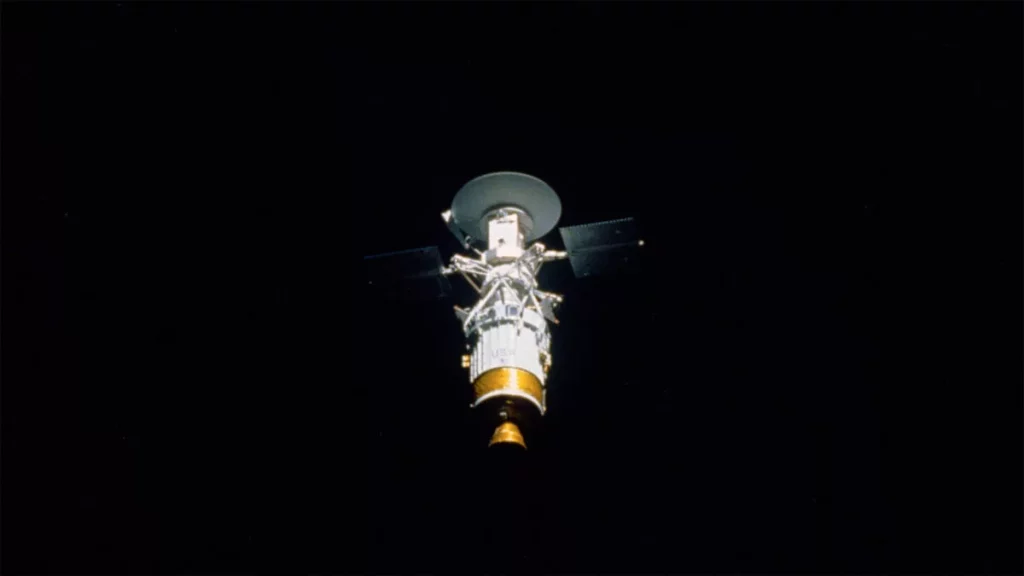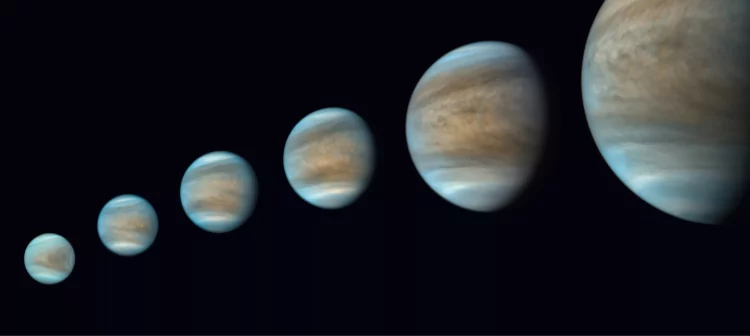Venus, often referred to as Earth’s “sister planet” due to its similar size and composition, is a world of extreme conditions and intriguing mysteries. Despite its proximity and apparent similarities to Earth, Venus presents a stark contrast with its dense atmosphere, intense heat, and volcanic landscape. This article offers an in-depth exploration of Venus, examining its physical features, atmospheric dynamics, exploration history, and scientific importance.
I. Overview of Venus
1. Basic Facts
- Size and Mass: Venus is the second planet from the Sun, with a diameter of about 12,104 kilometers (7,521 miles) and a mass approximately 81.5% that of Earth. Its size and mass make it the closest in physical characteristics to Earth among the planets in our Solar System.
- Orbit and Rotation: Venus orbits the Sun at an average distance of about 108 million kilometers (67 million miles), or 0.72 Astronomical Units (AU). Its orbit is nearly circular, resulting in minimal seasonal variation. Venus has a very slow rotation, taking about 243 Earth days to complete one rotation. Interestingly, its rotation is retrograde, meaning it spins in the opposite direction to most other planets, including Earth. A day on Venus (one full rotation) is longer than a year on Venus (one complete orbit around the Sun), which lasts about 225 Earth days.
- Atmosphere: Venus has a thick, toxic atmosphere composed mainly of carbon dioxide (about 96.5%) and nitrogen (about 3.5%), with trace amounts of other gases such as sulfur dioxide. This atmosphere creates a runaway greenhouse effect, leading to extreme surface temperatures.
2. Physical Characteristics
- Surface Temperature: Venus is the hottest planet in the Solar System, with surface temperatures averaging around 467 degrees Celsius (872 degrees Fahrenheit). This extreme heat is primarily due to the dense carbon dioxide atmosphere, which traps heat through the greenhouse effect.
- Surface Pressure: The atmospheric pressure at Venus’ surface is about 92 times that of Earth’s, equivalent to the pressure found 900 meters (3,000 feet) underwater on Earth. This immense pressure is another factor contributing to the planet’s harsh conditions.
- Surface Composition: Venus’s surface is composed of volcanic plains, mountain ranges, and highland regions. The planet features extensive lava plains, possibly formed by volcanic activity. There are also numerous volcanoes and large, circular features known as coronae, which are thought to result from volcanic activity and tectonic forces.
II. Atmospheric Dynamics
1. Composition and Structure
- Cloud Layers: Venus’s atmosphere is layered with thick clouds of sulfuric acid, which obscure the planet’s surface from view. These clouds reflect about 70% of the sunlight that reaches Venus, contributing to the planet’s bright appearance as seen from Earth.
- Greenhouse Effect: The runaway greenhouse effect on Venus is caused by the high concentration of carbon dioxide, which traps heat and prevents it from escaping into space. This effect is responsible for the extreme temperatures observed on Venus.
- Weather Patterns: Venus experiences extreme weather patterns, including high-speed winds in the upper atmosphere. The planet’s cloud tops have winds that blow at speeds of up to 360 kilometers per hour (220 miles per hour), creating a super-rotational atmosphere where the cloud tops rotate much faster than the planet itself.
2. Atmospheric Circulation
- Super-Rotation: The phenomenon of atmospheric super-rotation on Venus means that the atmosphere rotates around the planet much faster than the planet’s surface. This super-rotation is thought to be driven by the planet’s intense heat and differential heating between the equator and the poles.
- Polar Vortex: Venus has a polar vortex at its poles, where the atmosphere forms large, rotating features. These vortices are thought to be influenced by the planet’s unique atmospheric dynamics and super-rotation.
- Thunderstorms and Lightning: Although the dense clouds and extreme conditions make it difficult to observe directly, evidence suggests that Venus may experience electrical activity, including lightning. Observations from spacecraft have detected possible lightning strikes in the planet’s thick clouds.

III. Surface Features and Geology
1. Volcanism and Lava Plains
- Volcanoes: Venus has numerous volcanoes, some of which are still considered active. The planet’s surface is dotted with large volcanic structures, including shield volcanoes and large calderas. The largest volcano, Maat Mons, rises about 8 kilometers (5 miles) above the surrounding plains.
- Lava Plains: The volcanic plains of Venus are extensive and cover much of the planet’s surface. These plains are believed to be formed by extensive lava flows from volcanic eruptions. The smooth, flat terrain suggests that lava has covered and resurfaced much of the planet.
2. Highlands and Mountain Ranges
- Ishtar Terra: One of Venus’s prominent highland regions, Ishtar Terra, is roughly the size of Australia and features mountainous terrain. It includes the large Maxwell Montes, the tallest mountain range on Venus, rising approximately 11 kilometers (7 miles) above the surrounding plains.
- Aphrodite Terra: Another significant highland region, Aphrodite Terra, is comparable in size to Africa and features a complex landscape of ridges and valleys. The terrain in this region is thought to be the result of tectonic forces.
3. Impact Craters
- Craters: Venus has relatively few impact craters compared to other rocky planets, suggesting that its surface is relatively young and has been resurfaced by volcanic activity. The craters that do exist are typically shallow and have been modified by volcanic and tectonic processes.
- Unique Features: Some impact craters on Venus exhibit unusual features, such as central peaks and complex structures, likely due to the planet’s extreme surface conditions and high pressure.
IV. Exploration History
1. Early Observations
- Ground-Based Observations: Early telescopic observations of Venus revealed its bright appearance and phases similar to those of the Moon. However, the planet’s thick atmosphere made it challenging to study its surface.
2. Pioneer Venus Missions
- Pioneer Venus: Launched in 1978, NASA’s Pioneer Venus program consisted of three spacecraft: the Pioneer Venus Orbiter, the Pioneer Venus Multiprobe, and the Pioneer Venus North Polar Orbiter. The mission provided the first detailed data on Venus’s atmosphere, surface, and clouds.
- Key Discoveries: Pioneer Venus confirmed the presence of a thick, carbon dioxide-rich atmosphere and provided valuable data on the planet’s surface pressure and temperature. The mission also revealed the presence of large volcanic structures and extensive lava plains.
3. Magellan Mission
- Magellan: Launched in 1989, NASA’s Magellan spacecraft was equipped with a synthetic aperture radar (SAR) to map the surface of Venus through its dense clouds. The spacecraft orbited Venus from 1990 to 1994.
- Scientific Contributions: Magellan’s radar mapping provided a detailed view of Venus’s surface, revealing its volcanic features, mountain ranges, and impact craters. The mission significantly enhanced our understanding of Venus’s geology and topography.
4. ESA’s Venus Express
- Venus Express: Launched by the European Space Agency (ESA) in 2005, Venus Express was designed to study the planet’s atmosphere, climate, and surface. The spacecraft operated until 2014.
- Key Findings: Venus Express provided detailed observations of the planet’s atmospheric composition, weather patterns, and cloud structures. The mission also observed the planet’s super-rotating atmosphere and provided insights into its climatic processes.
5. Akatsuki Mission
- Akatsuki: Launched by the Japan Aerospace Exploration Agency (JAXA) in 2010, the Akatsuki spacecraft aimed to study Venus’s atmosphere and weather. After an initial failure to enter orbit, Akatsuki successfully entered Venus’s orbit in 2015.
- Scientific Contributions: Akatsuki has provided valuable data on Venus’s atmospheric dynamics, including detailed observations of its cloud patterns and wind velocities. The spacecraft continues to monitor the planet’s weather and atmospheric phenomena.
V. Scientific Significance
1. Understanding Planetary Atmospheres
- Greenhouse Effect: Studying Venus helps scientists understand the greenhouse effect in an extreme environment. The runaway greenhouse effect on Venus provides insights into how greenhouse gases can influence planetary climates.
- Atmospheric Dynamics: Venus’s unique atmospheric dynamics, including super-rotation and polar vortices, offer valuable information about atmospheric circulation processes that can be applied to other planets and exoplanets.
2. Comparative Planetology
- Earth’s Twin: Comparing Venus with Earth provides insights into the similarities and differences between rocky planets. Despite its similarities in size and composition, Venus’s extreme conditions highlight the role of atmospheric composition and greenhouse gases in shaping planetary climates.
- Planetary Evolution: Studying Venus’s geological features, such as its volcanic plains and impact craters, helps scientists understand the processes that shape rocky planets and their evolutionary histories.
3. Climate and Habitability Studies
- Climate Models: Venus serves as a natural laboratory for studying climate models and the effects of greenhouse gases. Understanding Venus’s climate helps scientists predict the potential outcomes of climate change on Earth and other planets.
- Habitability Research: Exploring Venus’s extreme conditions contributes











































Discussion about this post